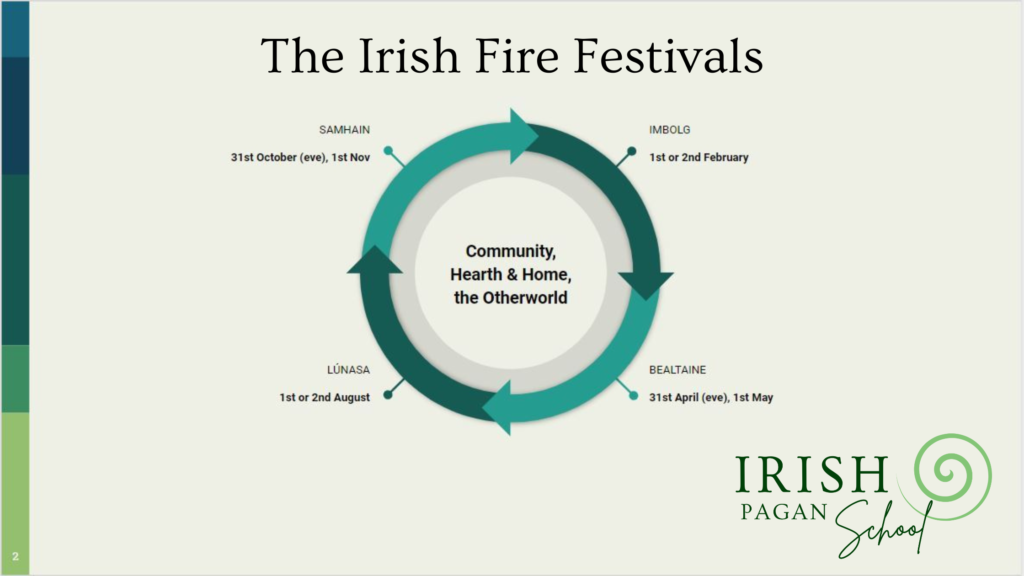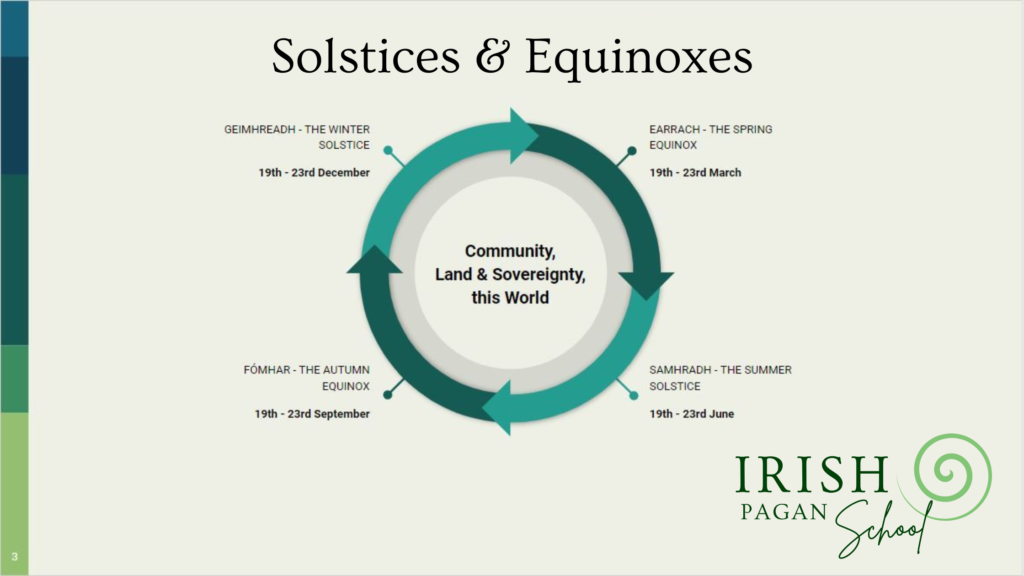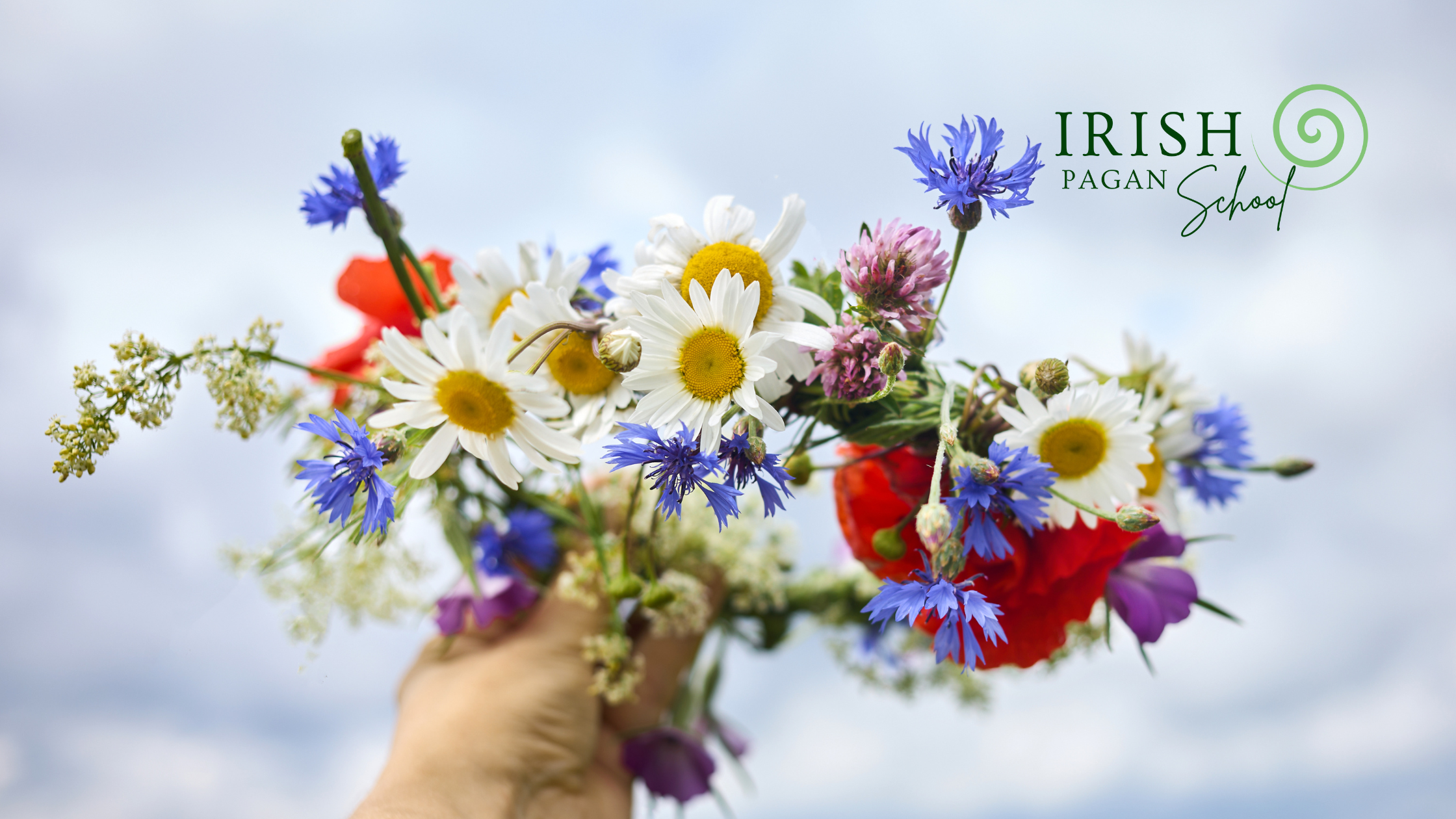How (and why) do we celebrate Irish Pagan holidays in Contemporary Irish Paganism?
Pagan Holidays (Holy Days) worldwide are coming back to a more general use and understanding, with folk often asking questions about whether Christmas is a Pagan Holiday (it is, sort of), and observing the 8-fold Wheel of the Year.
The current Neo Pagan calendar (and its primarily Wiccan holidays) is ostensibly based off the ‘Celtic Wheel of the Year’, as the early creators and authors of our modern traditions were very fond of their romantic notions of Celtic culture, and very sure that it was ok to just… take what they wanted, and change or use it however they wanted.
The problem with this (one of the problems) is that we now have a sort of tangled, much mangled, view of the original pre-christian Irish Pagan festivals, that even many Irish Pagans adhere to.
In this article, I’ll break this down a bit, and clarify some of the basics, so that we can (hopefully), start fresh. With a somewhat cleaner slate for Irish Pagan practice. Le do thoil.
The Wheel of the Year
To begin with, the ‘traditional’ eight Pagan Holidays, are actually 2 sets of four, when you’re working with Irish Pagan holidays specifically. So the wheel of the year is maybe 2 wheels, rotating side by side.
This can be a little confusing if you’re not used to considering things this way, but I do remember being quite frustrated back in my baby Pagan days by how the festivals seemed to just be copies of each other. Like, within the Wiccan traditions, there’s not a huge difference between how you’re celebrating the Summer Solstice (Litha) and Beltane (as they call it), for example.
In my native practice, I break the focus, themes or concerns out as follows:
- The Fire Festivals – with Community elements, but a focus on Hearth & Home, and the Otherworld.
- The Solstices and Equinoxes – with Community elements, but a focus on the Land & Sovereignty, and this World.
In the Irish tradition which followed from British occupation, the four dates in each year on which servants were hired, school terms started, and rents were due were called Quarter Days. They fell on four religious festivals roughly three months apart and close to the two solstices and two equinoxes.
Prior to the Christianisation of Ireland though, the native ‘quarter days’ were observed as our Fire Festivals, but these are now called Cross-Quarter Days as they fall about halfway into each of the Quarters as described above. In 2022 a bank (public) holiday for Imbolc was added, which means that all four Fire Festivals are now marked here by an annual public holiday.
The Contemporary Pagan calendar names I use are in modern Irish, and any associated Gaeilge pronunciation is provided in my standard schooling modern Irish accent, to be clear. I did not grow up in a Gaeltacht region, nor a Gaelgoir household, so what I know I’ve had to learn as I go.
Irish is a living language, and while I’m the first one to honour the Primitive Irish and Old Irish source material, they are different languages. We have modern Irish terminology for every single Pagan Holiday name, and a wealth of associated folklore and traditions within our living memory in Irish communities. So let’s use that.
Admittedly now, some of the folklore has gotten crossed over and shifted around with the Christian influences, eg. Summer Solstice bonfires now happen on St. John’s Eve, on the 23rd June, and the animal sacrifice tradition has moved from Samhain to St. Martin’s Day, on the 11th November. But that’s ok too.
At least the traditions still exist, and have grown and moved with the communities as we did.
Irish Pagan Holidays – the Fire Festivals
Focus on Community, Hearth & Home, the Otherworld (an Saol Eile).
When people first walked this land, there were 2 seasons: summer and winter. They signified the change and move between camping grounds, as theirs was a Hunter/Gatherer lifestyle.
These times of moving and changing were dangerous and uncertain, and this still holds true in the primary Irish Pagan holidays of Bealtaine, and Samhain, which remain times of great change and uncertainty.
When the people settled, and began to farm the land, the seasons of Growth and Harvest were marked, with Imbolc (Imbolg) and Lúnasa, and so began the 4 Fire Festivals.

Take a Class – Seasons and Sacred Cycles
IMBOLC (also Imbolg)
Personally, I use the name Imbolg for this festival. That’s from the Irish i mBolg, meaning ‘in the belly’, for the pregnancy aspects (animals as well as humans, because if we get pregnant at Bealtaine we give birth around now).
Imbolc is commonly used too though, and may have associations with washing or a ‘spring clean’ after winter, from Folc, meaning ‘bathe or wash’. I’m honestly not sure which language the term Oimelc comes from, though it’s been given to mean ‘ewe’s milk’. That would be Bainne na Caoirigh in modern Irish though, which doesn’t have quite the same ring to it.
Irish Language Resource – https://www.teanglann.ie/en/fgb/Bolg or https://www.teanglann.ie/en/fgb/Folc
BEALTAINE
We have this clearly in old Irish as Belltaine (with various other spellings, the manuscripts weren’t always precise or standardised), meaning the month of May, or even ‘the month of the beacon-fire) according to the eDIL. It may have associations with an Old Celtic God Boleros, ‘the flashing one’ (Ó hÓgáin) or Balar/Balor in Ireland, he of the single, blazing destructive eye (often thought to be symbolic of the sun), and form the word Bealtaine from Balor’s Fire (tine). Modern scholars dispute this origin however.
There are multiple spellings out there, and I know some of them are based on the Gaelic language of Scotland, which I don’t speak. But as we still use the word Bealtaine in modern Irish for the month of May, and again – this is a living language, and it’d be great not to have to deal with bastardised or anglicised versions of it anymore please and thank you – let’s go with that eh?!
Irish Language Resource – https://www.teanglann.ie/en/fgb/Bealtaine
LÚNASA
You’ll often see this written as Lughnasadh, and indeed, I’ve done so myself. As above though, I prefer the modern Irish spelling, and in Gaeilge, Lúnasa is the word for the month of August. I mean, I wasn’t joking about these Pagan holidays still being a part of our culture, a living tradition.
It’s most likely connected to the Old God Lugh, (lug in old Irish can be ‘magnificent, heroic, warlike’: eDIL), and Lugnasad is ‘the festival of Lugh, the first of August’: eDil.
You’ll see references too, to Lammas, which we don’t have in modern Irish. My basic exploration of Old Irish suggests it MIGHT be a version of a ‘fine, handsome or excellent hand’ (from n. Lám and adj. Mass?)… but be warned, that is a very rudimentary look at a compound word! I definitely don’t use it as a Pagan Holiday name anyway.
Irish Language Resource – https://www.teanglann.ie/en/fgb/Lúnasa
SAMHAIN
It’s not pronounced Sam-Hane. Never. I don’t care what your esteemed Elders passed down to you not-so-very-long-ago (in the grand scheme of things). This is a LIVING LANGUAGE. Respect it, and the people who still speak it every day. Stop that Sam-Hane shit immediately.
That being said, Samhain probably comes from the Old Irish samfuin, meaning ‘death of Summer’: eDIL. Samhain in modern Irish is the word for the month of November.
So yes, we know how to pronounce it properly. (Are you getting a sense for how many times I’ve had U.S. Pagans correct my pronunciation? Like, I’m not sure how to even communicate how infuriating that is, especially when it happens consistently!)
Irish Language Resource – https://www.teanglann.ie/en/fgb/Samhain
Irish Pagan Holidays – Free Guides to the Fire Festivals
🕯️Seasonal Offer –> Click for the Imbolc Fire Festival Cheat Sheet 🔥
⭐Seasonal Offer –> Click for the Bealtaine Fire Festival Cheat Sheet 🔥
👻Seasonal Offer –> Click for the Samhain Fire Festival Cheat Sheet 🔥
🌻Seasonal Offer –> Click for the Lúnasa Fire Festival Cheat Sheet 🔥
😉
Irish Pagan Holidays – Solstices & Equinoxes
Focus on Community, Land & Sovereignty, this World (an Saol Sin – or Seo).
We know these times were important to our ancestors due, at least, to the sacred sites they constructed and used to observe and celebrate them. Massive monuments all over the island still attest to the power and value that was placed upon aligning ourselves, our communities, and our leadership, with these turning times of the Pagan year.
Please note: the common names Ostara, Litha, Mabon, and Yule, are at best culturally appropriated and co-opted into Neo Paganism, and at worst, carry entirely fabricated pseudo histories. I’m looking at you, Mabon.
They have NO place in native Irish paganism.
(Although we ethically and essentially disagree with Patheos as an organisation, and with many of the authors who write for them on Paganism, this is an article by Aidan Kelly explaining why he essentially made up many of the common names for the Pagan Festivals from the 1970s on. Take it as you will.)
The Irish names below are simply the names of our seasons, as Gaeilge, and have always suited my personal practice around the Irish Pagan Holidays best.

Take a Class – Seasons and Sacred Cycles
EARRACH – THE SPRING EQUINOX
The balance of day and night. The Vernal Equinox in Irish is Cónocht an Earraigh.
Irish Language Resource – https://www.teanglann.ie/en/fgb/Earrach
SAMHRADH – THE SUMMER SOLSTICE
Mid Summer, the longest day. The Summer Solstice in Irish is Grianstad an tSamhraidh.
Irish Language Resource – https://www.teanglann.ie/en/fgb/Samhradh
FÓMHAR – THE AUTUMN EQUINOX
The balance of night and day. The Autumn Equinox in Irish is Cónocht an Fhómhair.
Irish Language Resource – https://www.teanglann.ie/en/fgb/Fómhar
GEIMHREADH – THE WINTER SOLSTICE
Mid Winter, the longest night. The Winter Solstice in Irish is Grianstad an Gheimhridh.
Irish Language Resource – https://www.teanglann.ie/en/fgb/Geimhreadh
RESOURCES for Irish Pagan Holidays
- You can find all our Irish Pagan Holidays blog posts under the tag Festivals – Here.
- You can find all of our Online Classes about Irish Pagan Holidays – Here.
- We recommend Marion McGarry’s book: Irish Customs and Rituals – Here.
✨ For a categorised selection of trustworthy resources on Irish Spirituality related topics, including more on our Irish Pagan Holidays…
🔗Get Your Free Resources Checklist🔗




[…] memorial games are one of the four main Irish Fire Festivals, along with Samhain, Imbolc, and Bealtaine. This Pagan Holiday was one of the most significant of […]
[…] has a strong association with Samhraidh (Grianstad an tSamhraidh – Midsummer) and the sun in general, and can be represented by a red mare (McKillop, […]
[…] For special occasions like seasonal celebrations or personal rites of passage, you can decorate your altar with additional items that are symbolic […]
[…] Irish, Samhain refers both to the Fire Festival and to the month of […]
Thank you for the clarification
Thank you so much for this quick clarification post! Definitely cleared up a few things for me!
[…] it also names a time that begins with the shift from spring into summer. This was one of the four Fire Festivals of the Irish […]